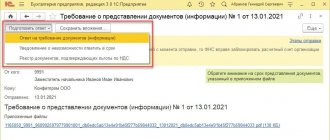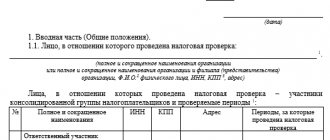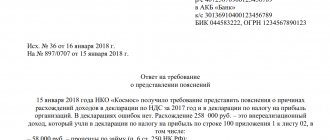What is the article about? 112 of the Tax Code of the Russian Federation
Article 112 of the Tax Code of the Russian Federation specifies a list of factors that will allow an organization to reduce the amount of penalties received from the inspection . This list is open and freely available for review.
Interest in the information contained in Art. 112 of the Tax Code of the Russian Federation must be exercised directly by the legal entity itself in whose name the fine was issued, since it is in its interests to reduce the amount to be paid. After determining the circumstances that may reduce the amount of the fine, the organization must submit a corresponding application, supplementing it with the necessary accompanying documents.
List of factors that may lead to a reduction in the fine:
- the identified violations arose against the background of difficult personal experiences
- the violation was committed under the influence of threats , material blackmail, management pressure
- an individual who will suffer financial punishment for a violation is in a difficult financial situation
The list may be supplemented by other reasons that may be taken into account when considering the case.
How much can the fine be reduced?
According to paragraph 3 of Art. 114 of the Tax Code of the Russian Federation, if there is at least one mitigating circumstance, the punishment must be reduced by at least 2 times compared to the original amount.
At the same time, paragraph 16 of the resolution of the Plenum of the Supreme Arbitration Court of the Russian Federation dated July 30, 2013 No. 57 states that paragraph 3 of Article 114 of the Tax Code of the Russian Federation establishes only the minimum limit for reducing sanctions. Based on the results of an assessment of the circumstances, the court has the right to reduce the amount of the penalty by more than half and even make it below the minimum amount (see letters from the Ministry of Finance of Russia dated May 16, 2012 No. 03-02-08/47, dated January 30, 2012 No. 03-02-08 /7).
However, neither the Federal Tax Service nor the court can reduce the amount of sanctions to zero, since this action will be considered an exemption from liability for the offense committed.
If there are mitigating facts, only the amount of penalties applied can be reduced; the amount of taxes and penalties on these grounds cannot be reduced.
A sample petition to the tax office to reduce the fine, which can be downloaded at the end of the article, is based on the circumstances given in paragraphs. 3 p. 1 art. 112 of the Tax Code of the Russian Federation.
What other reasons have been encountered in the practice of tax authorities?
During the consideration of many cases by the tax inspectorate, factors such as:
- if there is a small number of days of delay in payment to the budget or failure to submit a declaration
- the taxpayer had no previous offenses or debts , he fully agrees with the opinion of the inspectors, the organization voluntarily discovered and eliminated errors in accounting
- the organization carries out charity events
- the activity of the enterprise is of a social nature , for example, agriculture
- the organization is in an extremely difficult financial situation , is being liquidated, undergoing bankruptcy proceedings
- the activities carried out by the taxpayer are seasonal in nature
- difficult financial situation of an individual against whom a fine has been issued
- if an individual is recognized as disabled or struggling with a serious illness
- family or personal factors influenced the commission of the offense
- if the offense does not correspond to the amount of penalties imposed , i.e. did not lead to the loss of budget funds, negative consequences in the economy, and the legal entity did not have malicious intent at the time of the violation
Circumstances affecting liability for tax violations
Definition 1
Circumstances affecting liability for a tax offense are signs of an act that are both objective and subjective in nature, beyond the scope of a tax offense, the consideration of which by the bodies imposing punishment can either reduce or increase the severity of tax liability.
Responsibility for a tax offense occurs only after the tax authority makes an appropriate decision, that is, the fact of committing an offense is established and proven.
The responsibilities of the heads of the tax authority and his deputy include not only establishing the subject of the offense, the existence of elements and grounds for prosecution, but also those circumstances that could affect the degree of guilt of the offender, or exclude the guilt of the act.
Are you an expert in this subject area? We invite you to become the author of the Directory Working Conditions
Note 1
Circumstances affecting the degree of tax liability can only be identified after the fact of the offense has been established.
As an important part of the institution of responsibility for tax offenses, aggravating circumstances make it possible to take into account the nature of the offense committed and the identity of the perpetrator. Punishment becomes individualized. The content and range of these circumstances, reflecting the needs of society, the interests of individual social groups, and the political situation, may change.
A case where the offense was committed with intent
If the actions of the taxpayer organization are proven to indicate an intentional offense , then the use of mitigating circumstances in this case is impossible.
The following is a list of acts after which the use of mitigating factors will be denied:
- if the application of penalties resulted from the activities of persons who were no longer on the staff of the organization, i.e. were fired
- did not have the necessary amount in its current accounts to pay the relevant taxes and sanctions
- the enterprise is obviously unprofitable
- presence of accounts payable to suppliers of products, works and services
- critical financial situation in society
- there is a creditor's lien in relation to the leased equipment
The Federal Tax Service, with the assistance of the Investigative Committee of the Russian Federation, has developed recommendations that make it possible to establish cases of intentional tax offenses. These standards were published in letter dated July 13, 2017 No. ED-4-2/ [email protected] and are freely available.
The development of this document was based on a thorough analysis of a huge amount of materials on inspections carried out and court decisions made.
If during the inspection it is confirmed that a deliberate offense has been committed, then a more severe punishment will follow than previously planned. The fine for deliberate non-payment of taxes is almost twice as large as for unintentional non-payment. In accordance with Art. 122 of the Tax Code of the Russian Federation, the fine will be increased by 40% of the unpaid amount.
It is also worth remembering that malicious non-payment of taxes may result in criminal liability.
Circumstances mitigating and aggravating liability for committing a tax offense.
The following are recognized as mitigating circumstances (clause 1 of Article 112 of the Tax Code of the Russian Federation):
1) commission of an offense due to a combination of difficult personal or family circumstances;
2) commission of an offense under the influence of threat or coercion or due to financial, official or other dependence;
3) the difficult financial situation of an individual held accountable for committing a tax offense.
This list of circumstances mitigating tax liability is open, since paragraphs. 3 p. 1 art. 112 of the Tax Code of the Russian Federation gives the right to the court or tax authority considering a case of a tax offense to recognize as a mitigating circumstance any other circumstance not mentioned in paragraph 1 of Art. 112 of the Tax Code of the Russian Federation.
The mechanism for implementing circumstances mitigating liability is determined by Art. 114 Tax Code of the Russian Federation. According to paragraph 3 of Art. 114 of the Tax Code of the Russian Federation, in the presence of at least one mitigating circumstance, the amount of the fine is subject to reduction by at least two times compared to the amount established by the corresponding article of Chapter. 16 or 18 of the Tax Code of the Russian Federation.
From the analysis of Art. 112 of the Tax Code of the Russian Federation it follows that the establishment of mitigating circumstances is not only a right, but also an obligation of the court or tax authority considering the case (clause 4 of Article 112 of the Tax Code of the Russian Federation).
An aggravating circumstance is the commission of a tax offense by a person who was previously held accountable for a similar offense, that is, a repeated tax offense (Clause 2 of Article 112 of the Tax Code of the Russian Federation).
Repetition occurs if the following conditions are met:
1) the tax offense for which a person is currently being held accountable must be similar to a previously committed offense, that is, have similar features;
2) the person was held liable for a previous tax offense;
3) a new tax offense must be committed within 12 months from the date of entry into force of a court or tax authority decision to apply a tax sanction for a similar tax offense (clause 3 of Article 112 of the Tax Code of the Russian Federation).
A circumstance aggravating tax liability is also implemented through the rules contained in Art. 114 NK. If a court or tax authority establishes a sign of repetition, the amount of the fine increases twice as compared to the amount established by the corresponding special article of Chapter. 16 or 18 of the Tax Code of the Russian Federation (clause 4 of Article 114 of the Tax Code of the Russian Federation). It seems that this norm of the Tax Code of the Russian Federation does not contradict the constitutional principles of proportionality and fairness of punishment, since the very fact of the systematic nature of obviously illegal activities rightly entails an increase in the size of the sanction.
A tax sanction is a measure of responsibility for committing a tax offense (Clause 1, Article 114 of the Tax Code of the Russian Federation). By its nature, it is a type of legal sanction. At the same time, it has both general features characteristic of all legal sanctions in general, and a number of specific features, collectively inherent only to it:
1) a tax sanction is a form of legal liability, since its application presupposes a final assessment of the unlawful (in violation of the legislation on taxes and fees) act for which it is imposed as a tax offense;
2) a tax sanction is a measure of state coercion used in the field of public finance;
3) a tax sanction performs three functions - punitive (punitive), preventive-educational and restorative. The purpose of the punitive effect of a tax sanction is retribution, punishment of the offender for the unlawful act committed by him, the educational effect is the prevention of tax offenses, the restorative effect is compensation for losses incurred by the state or municipalities as a result of the shortfall in tax revenues;
4) tax sanctions are of a property nature, since according to clause 2 of Art. 114 of the Tax Code of the Russian Federation, they are established and applied in the form of monetary penalties (fines) in the amounts provided for in Chapter. 16 and 18 of the Tax Code of the Russian Federation.
The application of penalties acts as the main method of punitive impact of tax liability, which aims not only to punish the guilty party, but also to prevent tax offenses (general and private prevention). A fine entails a narrowing of the offender’s property sphere and a change in property relations.
In accordance with paragraph 5 of Art. 114 of the Tax Code of the Russian Federation, when two or more tax offenses are committed by one person, tax sanctions are collected for each offense separately without absorbing a less stringent sanction with a more stringent one.
The tax penalty may be paid by the taxpayer or other obligated person voluntarily.
A fine is collected from a taxpayer (fee payer, tax agent), who is an organization or individual entrepreneur, by decision of the tax authority by sending to the bank in which the accounts of this taxpayer (fee payer, tax agent) are opened, an order from the tax authority to write off and transfer to the budget system of the Russian Federation of the necessary funds (clause 2 of Article 46 of the Tax Code of the Russian Federation). Such a decision of the tax authority is made after the expiration of the period established in the requirement to pay a tax sanction, but no later than two months after the expiration of the specified period. A decision on collection made after the expiration of the specified period is considered invalid and cannot be executed. However, in this case, the tax authority may apply to the court with a claim to recover from the taxpayer (fee payer, tax agent) - organization or individual entrepreneur the amount of tax due for payment (clause 3 of Article 46 of the Tax Code of the Russian Federation).
If there are insufficient or absent funds in the accounts of the taxpayer (fee payer, tax agent) - organization or individual entrepreneur, or if there is no information about the accounts of the taxpayer (fee payer, tax agent) - organization or individual entrepreneur, the tax authority has the right to collect a fine at the expense of other property of the specified person (clause 7 of article 46 of the Tax Code of the Russian Federation). Collection of a fine at the expense of other property of the taxpayer (fee payer, tax agent) - organization or individual entrepreneur is carried out out of court (Article 47 of the Tax Code of the Russian Federation).
It should be noted that the Tax Code of the Russian Federation also provides for cases when the collection of a fine from an organization or individual entrepreneur can only be carried out in court (clauses 1-4, clause 2, article 45).
From a taxpayer who is an individual who is not an individual entrepreneur, the collection of fine amounts is carried out only in court (paragraph 1, paragraph 1, article 104 of the Tax Code of the Russian Federation).
A statement of claim for the recovery of a fine is filed (clause 2 of Article 104 of the Tax Code of the Russian Federation):
1) from an organization or individual entrepreneur - to the arbitration court;
2) from an individual who is not an individual entrepreneur - to a court of general jurisdiction.
Tax authorities may file a lawsuit to collect fines (Clause 1, Article 115 of the Tax Code of the Russian Federation):
from an organization and an individual entrepreneur - in the manner and within the time limits provided for in Art. 46 and Art. 47 Tax Code of the Russian Federation;
from an individual who is not an individual entrepreneur - in the manner and within the time limits provided for in Art. 48 Tax Code of the Russian Federation.
The following are recognized as mitigating circumstances (clause 1 of Article 112 of the Tax Code of the Russian Federation):
1) commission of an offense due to a combination of difficult personal or family circumstances;
2) commission of an offense under the influence of threat or coercion or due to financial, official or other dependence;
3) the difficult financial situation of an individual held accountable for committing a tax offense.
This list of circumstances mitigating tax liability is open, since paragraphs. 3 p. 1 art. 112 of the Tax Code of the Russian Federation gives the right to the court or tax authority considering a case of a tax offense to recognize as a mitigating circumstance any other circumstance not mentioned in paragraph 1 of Art. 112 of the Tax Code of the Russian Federation.
The mechanism for implementing circumstances mitigating liability is determined by Art. 114 Tax Code of the Russian Federation. According to paragraph 3 of Art. 114 of the Tax Code of the Russian Federation, in the presence of at least one mitigating circumstance, the amount of the fine is subject to reduction by at least two times compared to the amount established by the corresponding article of Chapter. 16 or 18 of the Tax Code of the Russian Federation.
From the analysis of Art. 112 of the Tax Code of the Russian Federation it follows that the establishment of mitigating circumstances is not only a right, but also an obligation of the court or tax authority considering the case (clause 4 of Article 112 of the Tax Code of the Russian Federation).
An aggravating circumstance is the commission of a tax offense by a person who was previously held accountable for a similar offense, that is, a repeated tax offense (Clause 2 of Article 112 of the Tax Code of the Russian Federation).
Repetition occurs if the following conditions are met:
1) the tax offense for which a person is currently being held accountable must be similar to a previously committed offense, that is, have similar features;
2) the person was held liable for a previous tax offense;
3) a new tax offense must be committed within 12 months from the date of entry into force of a court or tax authority decision to apply a tax sanction for a similar tax offense (clause 3 of Article 112 of the Tax Code of the Russian Federation).
A circumstance aggravating tax liability is also implemented through the rules contained in Art. 114 NK. If a court or tax authority establishes a sign of repetition, the amount of the fine increases twice as compared to the amount established by the corresponding special article of Chapter. 16 or 18 of the Tax Code of the Russian Federation (clause 4 of Article 114 of the Tax Code of the Russian Federation). It seems that this norm of the Tax Code of the Russian Federation does not contradict the constitutional principles of proportionality and fairness of punishment, since the very fact of the systematic nature of obviously illegal activities rightly entails an increase in the size of the sanction.
A tax sanction is a measure of responsibility for committing a tax offense (Clause 1, Article 114 of the Tax Code of the Russian Federation). By its nature, it is a type of legal sanction. At the same time, it has both general features characteristic of all legal sanctions in general, and a number of specific features, collectively inherent only to it:
1) a tax sanction is a form of legal liability, since its application presupposes a final assessment of the unlawful (in violation of the legislation on taxes and fees) act for which it is imposed as a tax offense;
2) a tax sanction is a measure of state coercion used in the field of public finance;
3) a tax sanction performs three functions - punitive (punitive), preventive-educational and restorative. The purpose of the punitive effect of a tax sanction is retribution, punishment of the offender for the unlawful act committed by him, the educational effect is the prevention of tax offenses, the restorative effect is compensation for losses incurred by the state or municipalities as a result of the shortfall in tax revenues;
4) tax sanctions are of a property nature, since according to clause 2 of Art. 114 of the Tax Code of the Russian Federation, they are established and applied in the form of monetary penalties (fines) in the amounts provided for in Chapter. 16 and 18 of the Tax Code of the Russian Federation.
The application of penalties acts as the main method of punitive impact of tax liability, which aims not only to punish the guilty party, but also to prevent tax offenses (general and private prevention). A fine entails a narrowing of the offender’s property sphere and a change in property relations.
In accordance with paragraph 5 of Art. 114 of the Tax Code of the Russian Federation, when two or more tax offenses are committed by one person, tax sanctions are collected for each offense separately without absorbing a less stringent sanction with a more stringent one.
The tax penalty may be paid by the taxpayer or other obligated person voluntarily.
A fine is collected from a taxpayer (fee payer, tax agent), who is an organization or individual entrepreneur, by decision of the tax authority by sending to the bank in which the accounts of this taxpayer (fee payer, tax agent) are opened, an order from the tax authority to write off and transfer to the budget system of the Russian Federation of the necessary funds (clause 2 of Article 46 of the Tax Code of the Russian Federation). Such a decision of the tax authority is made after the expiration of the period established in the requirement to pay a tax sanction, but no later than two months after the expiration of the specified period. A decision on collection made after the expiration of the specified period is considered invalid and cannot be executed. However, in this case, the tax authority may apply to the court with a claim to recover from the taxpayer (fee payer, tax agent) - organization or individual entrepreneur the amount of tax due for payment (clause 3 of Article 46 of the Tax Code of the Russian Federation).
If there are insufficient or absent funds in the accounts of the taxpayer (fee payer, tax agent) - organization or individual entrepreneur, or if there is no information about the accounts of the taxpayer (fee payer, tax agent) - organization or individual entrepreneur, the tax authority has the right to collect a fine at the expense of other property of the specified person (clause 7 of article 46 of the Tax Code of the Russian Federation). Collection of a fine at the expense of other property of the taxpayer (fee payer, tax agent) - organization or individual entrepreneur is carried out out of court (Article 47 of the Tax Code of the Russian Federation).
It should be noted that the Tax Code of the Russian Federation also provides for cases when the collection of a fine from an organization or individual entrepreneur can only be carried out in court (clauses 1-4, clause 2, article 45).
From a taxpayer who is an individual who is not an individual entrepreneur, the collection of fine amounts is carried out only in court (paragraph 1, paragraph 1, article 104 of the Tax Code of the Russian Federation).
A statement of claim for the recovery of a fine is filed (clause 2 of Article 104 of the Tax Code of the Russian Federation):
1) from an organization or individual entrepreneur - to the arbitration court;
2) from an individual who is not an individual entrepreneur - to a court of general jurisdiction.
Tax authorities may file a lawsuit to collect fines (Clause 1, Article 115 of the Tax Code of the Russian Federation):
from an organization and an individual entrepreneur - in the manner and within the time limits provided for in Art. 46 and Art. 47 Tax Code of the Russian Federation;
from an individual who is not an individual entrepreneur - in the manner and within the time limits provided for in Art. 48 Tax Code of the Russian Federation.
Explanations on the second paragraph of the norm
An analysis of the provisions of paragraph 2 of the article in question shows that the legislator provided for only one aggravating circumstance. It is expressed in the repeated commission of an offense for which the subject has already been brought to justice before. In other cases, there is no reason to talk about aggravating factors. In particular, this applies to situations where the entity committed a tax violation, but was not held accountable.
In this case, the reason why sanctions were not imposed on him does not matter. He will be considered not held accountable. Accordingly, tougher punishment is unacceptable. Moreover, in accordance with clause 3 of the norm in question, the subject is considered to be held accountable within 12 months. from the date of entry into force of the relevant decision made by a court or tax authority. If no sanctions were applied to the perpetrator before the violation was committed, then the Federal Tax Service has no legal basis for increasing the amount of the punishment.





